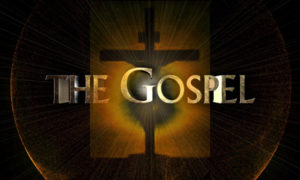 Yesterday, while I was out and about, I stopped into a business to get some info on a recall on our travel trailer and by a couple of LED lights. As I walked in I saw a friend sitting in his office and I decided to stop in and say hello. I always look for him as I have developed a relationship with him and as we talked, the conversation turned to church and ministry as my friend behind the desk was interested and wanted to know how things were going at the church to which I ministered. We have had this kind of conversation every time I stopped by and never seems to get past moralism as his default position.
Yesterday, while I was out and about, I stopped into a business to get some info on a recall on our travel trailer and by a couple of LED lights. As I walked in I saw a friend sitting in his office and I decided to stop in and say hello. I always look for him as I have developed a relationship with him and as we talked, the conversation turned to church and ministry as my friend behind the desk was interested and wanted to know how things were going at the church to which I ministered. We have had this kind of conversation every time I stopped by and never seems to get past moralism as his default position.
While we were talking this time, he told me, with some justified parental pride, that his daughter was a graduate in comparative religion and was now working on her Ph.D. in theology. I could see he was happy with her educational success and her apparent choice of future vocation, as he put it, “a theologian.”
As I left the room he made the comment that he was hoping his daughter would “put in a good word” for him with “The Almighty,” especially considering her chosen vocation and his relation to her. I turned around and said, “that’s not how it works.” He then defensively kidded around a bit and then his phone rang, and our conversation was over. One thing, though, is clear, my friend, at some conscious level understood he was a sinner. I plan on a revisit and to continue our conversation with the hopes of sharing the Gospel. I now have a much better starting point, his daughter.
But his attitude regarding religion, heaven, and morality are common expressions among those who are religious and those who are not. It’s a combination of looking for spiritual “shirttails,” and if that fails, ride into the “pearly gates” by our own self-perceived understanding of our over-riding righteousness vs. our moral deficits and/or our own personal altruism (we’re nice people). It is all one or versions of moralism. It’s the idea that if I live a certain way, “pay my dues,” abide by “the golden rule,” etc. I can earn my way in the good graces of “The Almighty.”
Within Evangelicalism, we have seen this theme raise its ugly head with a Gospel message that is moralistic and offers a therapeutic answer for self-improvement such as “Your Best Life Now.”[1] It is no wonder Osteen’s message is so popular. It’s all about finding the right “life coach,” which makes Christianity just another alternative, neither better or worse than other self-help alternatives. Michael Horton in his fine book, “Christless Christianity, The Alternative Gospel of the American Church,” puts it this way:
“Reduce Christianity to good advice and it blends in perfectly with the culture of life coaching. It might seem relevant, but it is actually lost in the marketplace of moralistic therapies. When we pitch Christianity as the best method of personal improvement, complete with testimonies about how much better we are ever since we “surrendered all,” non-Christians can legitimately demand of us, ‘What right do you have to say that yours is the only source of happiness, meaning, exciting experiences, and moral betterment.’ Jesus is clearly not the only effective way to a better life or to being a better me. One can lose weight stop smoking, improve one’s marriage, and become a nice person without Jesus.”[2]
The default condition of lost humanity is to always revert to some form of self-help. It’s the gospel of moralism that says that man is not totally depraved, and there is within humanity the ability for self-improvement. It is this self-improvement that not only will bring personal happiness but will ultimately be approved by God. Of course, the later is the real issue.
The Gospel, the REAL Gospel, on the other hand, see man’s condition in sin as a hopeless proposition that cannot be remedied through self-help. There is no amount of self-righteousness that can change of condition before God (Isaiah 64:6; Psalm 14:1-3, 53:1-3; Job 14:4; Romans 3:9-23, Ephesians 2:8; Titus 3:5).
You can’t improve the natural corruptness of the condition of man through a gospel of self-help, therapy or religion. It can only be killed, crucified, and even that has to be done by Jesus Christ.
Romans 6:6-7 (ESV) 6 We know that our old self was crucified with him in order that the body of sin might be brought to nothing, so that we would no longer be enslaved to sin. 7 For one who has died has been set free from sin.
-Michael Holtzinger
[1] Joel Osteen, “Your Best Life Now: Seven Steps To Living At Your Full Potential,” New York, Warner, 2004
[2] Michael Horton, “Christless Christianity, The Alternative Gospel of the American Church,” Baker Books, 2008, pg.102
Other Resources:
“The Gospel According To Jesus,” by John MacArthur
“Ashamed of the Gospel, When The Church Becomes Like the World,” By John MacArthur
“Christless Christianity, The Alternative Gospel of the American Church,” By Michael Horton
“The Whole Christ,” Sinclair Ferguson
